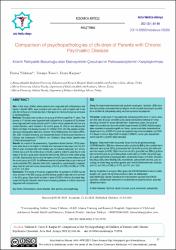| dc.description.abstract | Aim: In this study, children whose parents were diagnosed with schizophrenia and
bipolar I disorder (BID), were compared with each other, and compared with those
who did not have any mental disorders in their parents in terms of presence and types
of psychopathology.
Methods: This study was carried out on a group of children aged 6 to 17 years. The
parents of 11 children were diagnosed with schizophrenia, the parents of 36 children
were diagnosed with bipolar disorder and 47 children whose parents did not have any
mental disorders, were included in the control group. All children and adolescents
filled in the State-Trait Anxiety Inventory for Children (STAI-CH); the parents completed a socio-demographic data form, Conners’ Parent Rating Scale-Short form (CPRSSF), DSM IV-based Screening and Assessment Scale for Behavioural Disorders in
Children and Adolescents (T-DSM-IV) and Children’s Sleep Habits Questionnaire
(CSHQ)-Abbreviated Form.
Results: As a result of the assessments, Oppositional defiant disorder (ODD) symptoms were found to be higher in children who had parents diagnosed with the BID
(BID-c) when compared with both children who had parents diagnosed with schizophrenia (SZ-c) and the control group (p=0,08). Learning problems were found to be
higher in the SZ-c group when compared with both the (BID-c) and the control group
(p=0,08). State anxiety was found to be higher in the SZ-c group when compared with
the control group (p=0,020). No difference was found between the groups in terms of
conduct disorder (CD), attention deficit (AD), hyperactivity, psychosomatic complaint,
sleep disorder and trait anxiety (respectively; p=0,112, p=0,590, p=0,098, p= 0,776,
p=0,741, p=0, 924).
Conclusion: The results of the study suggested that the symptoms of ODD may be
more common in the BID-c group, and the learning problem might be more common
in the SZ-c group. Care should be taken in terms of ODD in children of parents diagnosed with bipolar I disorder, and in terms of learning problems in children of parents
diagnosed with schizophrenia. | en_US |


















